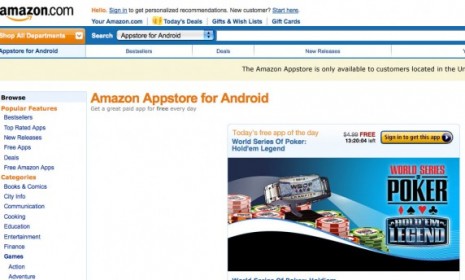Apple vs. Amazon 'app store' fight: 4 takeaways
Apple is suing Amazon for trademark infringement over its use of the phrase "app store." Here's what you need to know

A free daily email with the biggest news stories of the day – and the best features from TheWeek.com
You are now subscribed
Your newsletter sign-up was successful
Apple is suing Amazon for an undisclosed amount over the online retailer's use of the phrase "App Store," claiming it infringes on Apple's trademark. Sure, legal squabbles between tech giants are hardly uncommon. But this one is particularly compelling. Here, four key points:
1. Apple didn't create the term "app"... but it did popularize it
Linguists have found reference to the term "app" dating as far back as 1985, says John D. Sutter at CNN. But Apple is responsible for helping the term go mainstream, with the launch of its app store, and corresponding "there's an app for that" marketing campaign. Apple is credited, however, with creating the phrase "app store."
The Week
Escape your echo chamber. Get the facts behind the news, plus analysis from multiple perspectives.

Sign up for The Week's Free Newsletters
From our morning news briefing to a weekly Good News Newsletter, get the best of The Week delivered directly to your inbox.
From our morning news briefing to a weekly Good News Newsletter, get the best of The Week delivered directly to your inbox.
2. The suit raises sticky questions about trademarking generic terms
There are serious questions "about whether trademarks on generic terms inherently associated with a type of business are unfair," says Jason Mick at Daily Tech. "In recent years the U.S. Patent and Trademark Office (USPTO) has granted many such trademarks," giving Microsoft ownership of "Windows" and "Word," and Adobe ownership of "Illustrator."
3. Apple is very passionate about its "app store" terminology
"If anyone needed further proof that Apple is deadly serious about claiming all things 'App Store' as its own," this latest lawsuit should suffice, says Ashby Jones in The Wall Street Journal. Microsoft has already challenged the trademark on "App Store," and this lawsuit, filed Friday, shows that Steve Jobs and Co. have no intention of backing down.
A free daily email with the biggest news stories of the day – and the best features from TheWeek.com
4. But Microsoft is even more serious about its trademarks
On Monday, Microsoft sued Barnes & Noble and two manufacturers in Taiwan over patent infringement related to the Android software used in the Barnes & Noble Nook e-reader. That's a "more offensive" move than Apple's lawsuit against Amazon, says Rob Pegoraro in The Washington Post. While Apple's intellectual property litigation has its "silly moments, it "isn't as objectionable as Microsoft's — it's not trying to tax an entire segment of the mobile ecosystem."
-
 ‘This is something that happens all too often’
‘This is something that happens all too often’Instant Opinion Opinion, comment and editorials of the day
-
 House votes to end Trump’s Canada tariffs
House votes to end Trump’s Canada tariffsSpeed Read Six Republicans joined with Democrats to repeal the president’s tariffs
-
 Bondi, Democrats clash over Epstein in hearing
Bondi, Democrats clash over Epstein in hearingSpeed Read Attorney General Pam Bondi ignored survivors of convicted sex offender Jeffrey Epstein and demanded that Democrats apologize to Trump